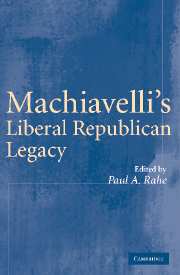Book contents
- Frontmatter
- Contents
- List of Contributors
- Acknowledgments
- Abbreviations and Brief Titles
- Introduction: Machiavelli's Liberal Republican Legacy
- Prologue: Machiavelli's Rapacious Republicanism
- PART I THE ENGLISH COMMONWEALTHMEN
- 1 Machiavelli in the English Revolution
- 2 The Philosophy of Liberty: Locke's Machiavellian Teaching
- 3 Muted and Manifest English Machiavellism: The Reconciliation of Machiavellian Republicanism with Liberalism in Sidney's Discourses Concerning Government and Trenchard's and Gordon's Cato's Letters
- PART II THE MODERATE ENLIGHTENMENT
- PART III THE AMERICAN FOUNDING
- Index
3 - Muted and Manifest English Machiavellism: The Reconciliation of Machiavellian Republicanism with Liberalism in Sidney's Discourses Concerning Government and Trenchard's and Gordon's Cato's Letters
Published online by Cambridge University Press: 24 July 2009
- Frontmatter
- Contents
- List of Contributors
- Acknowledgments
- Abbreviations and Brief Titles
- Introduction: Machiavelli's Liberal Republican Legacy
- Prologue: Machiavelli's Rapacious Republicanism
- PART I THE ENGLISH COMMONWEALTHMEN
- 1 Machiavelli in the English Revolution
- 2 The Philosophy of Liberty: Locke's Machiavellian Teaching
- 3 Muted and Manifest English Machiavellism: The Reconciliation of Machiavellian Republicanism with Liberalism in Sidney's Discourses Concerning Government and Trenchard's and Gordon's Cato's Letters
- PART II THE MODERATE ENLIGHTENMENT
- PART III THE AMERICAN FOUNDING
- Index
Summary
When selecting the curriculum for the university that he had founded, Thomas Jefferson identified the sources from which he believed the American principles of government derived. The minutes of the 4 March 1825 meeting of the Board of Visitors for the University of Virginia report the following resolution: “it is the opinion of this Board that as to the general principles of liberty and the rights of man, in nature and in society, the doctrines of Locke, in his ‘Essay concerning the true original extent and end of civil government,’ and of Sidney in his ‘Discourses on government,’ may be considered as those generally approved by our fellow citizens of this, and the United States” (WrTJ [ed. Peterson] 479). The Board enjoined its scholars to imbibe the prescribed dose of American liberty directly from its sources in the thought of these two Englishmen.
What was so apparent to Virginia's Board of Visitors is no longer clear to scholars of the American founding. The Board's declaration challenges in at least two fundamental ways the course of several decades of prominent scholarship on the founding. First, it asserts the importance of John Locke; and second, it asserts that the thought of Locke and Algernon Sidney are compatible.
The principles of the American revolutionaries, this scholarship maintains, were republican, inspired by Niccolò Machiavelli, not liberal, inspired by John Locke. In this way, the republican scholarship argues that Locke's thought was largely irrelevant to the work of the American revolutionaries.
- Type
- Chapter
- Information
- Machiavelli's Liberal Republican Legacy , pp. 58 - 86Publisher: Cambridge University PressPrint publication year: 2005



